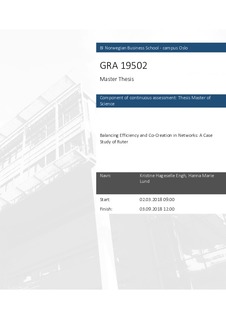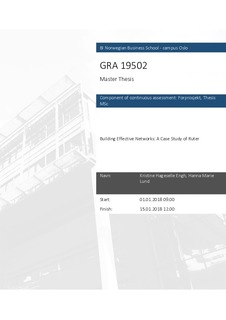| dc.description.abstract | This thesis aims to explore how efficient coordination and co-creation for
innovation can be combined in a business network. To study this, we build on
literature about networks and knowledge sharing, to provide insight on the
mechanisms that can affect efficiency and the collaborative environment in the
network.
We study this in the context of Ruter and its network of operators and partners. The
network provides public transport services in Oslo and Akershus, and consist of 11
member organisations that operate a variety of services, coordinated by the
administrative company, Ruter. A case study research design has been applied to
examine the phenomenon and gain insights on how the network has evolved over
time. We conducted 27 interviews with key individuals from all 11 member
organisations and accessed archival data on the network. With this solid basis of
data, we were able to gain an in-depth understanding of the network’s development
over time and the characteristics that affect learning and co-creation in the network.
In our study we find that the network has gone from a turbulent start, to become an
efficient service provider with well-functioning collaboration at an operational
level. By joining efforts to work on achieving a common goal, the network managed
to become highly efficient and created a solid basis for a good collaborative
environment. Until recently, the main focus of the network has been on exploiting
knowledge and resources to improve their services and to meet the passenger
growth. Today’s complex and changing environment requires the network to
collectively shift the focus towards exploration and co-creation, in order to continue
to deliver high-quality services that satisfy the continuously changing demand from
customers and stakeholders. However, we argue that exploration should not come
at the expense of the overall efficiency of the network, but rather be balanced in
order to secure progress in both dimensions.
Balancing efficient coordination and co-creation can be difficult because these two
dimensions have attributes that are fundamentally different. We find some attributes
of efficiency, such as strong contractual focus, low levels of involvement and
rigidity, to have an inhibiting effect on exploration and co-creation in the network. However, we also find some of these attributes to be crucial for the network’s
further development. This thesis contributes to the literature on network
development, by discussing how the network, despite these attributes, can facilitate
co-creation, without significantly compromising efficient coordination. | nb_NO |

